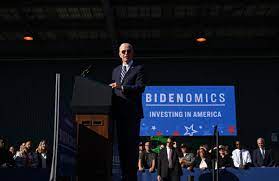WASHINGTON (AFP): President Joe Biden announced new “hydrogen hubs” across the United States on Friday as part of efforts to boost the economy with green energy ahead of the 2024 election.
“I’m here to announce one of the largest advanced manufacturing investments in the history of this nation — $7 billion in federal investments is going to attract $40 billion in private investment in clean hydrogen power,” Biden said.
The 80-year-old Democrat traveled to Philadelphia to unveil the regions that won a bidding war for billions of dollars in funding to make the clean fuel, including a number in electoral battleground states.
The aim of the hubs is to produce around three million metric tons of clean hydrogen a year, amounting to one third of the US production goal for 2030, and reduce emissions.
“Taken together, the emission reductions from these hydrogen hubs will be the equivalent of taking 5.5 million gas powered vehicles off the road,” Biden said.
Biden, who is neck and neck with his likely rival next year, Republican Donald Trump, has made green energy a key part of his “Bidenomics” plan to revive US industry and create jobs.
Hydrogen power is a key component of his goal to combat the climate crisis and get the United States to “net zero” emissions from pollutants no later than 2050, he said.
The huge funding boost will go to large-scale hydrogen production, the pipelines to transport it, and help industries and businesses adapt to using the fuel.
The hubs are to be in California; Texas; the US east coast; the Midwest; the Pacific Northwest; the Appalachian mountain region in the northeast; the northern states of Minnesota, North Dakota, South Dakota.
Two of the states involved — Pennsylvania in the eastern region and Michigan in the Midwest — were crucial swing states in the 2020 election when Biden beat Trump, and are likely to be again next year.
– Fossil fuel worry –
Some non-profit groups expressed concern that the latest initiative could perpetuate harms from fossil fuels.
The Union of Concerned Scientists warned in a statement that the hubs announcement “advances multiple projects premised on fossil fuel-based hydrogen production and risky hydrogen end uses.”
US authorities must set rigorous criteria “to ensure the development of a hydrogen industry that is unequivocally aligned with our climate objectives,” said Julie McNamara, deputy policy director of the group’s climate and energy program.
Lauren Pagel, policy director at another nonprofit, Earthworks, charged that prioritizing hydrogen hubs “is more about extending the life of oil & gas companies than addressing the climate crisis.”
Frontline communities should have a chance to “meaningfully engage and shape the selected hub proposals,” Pagel added.
The hydrogen hubs are funded by the Bipartisan Infrastructure Law, which includes $65 billion in clean energy investments at the Department of Energy.
Biden has pledged to increase production capacity for low- and zero-carbon emission sources, which are known as “blue” and “green” hydrogen.
Blue hydrogen is produced from natural gas in which the carbon dioxide from the manufacturing process is captured. Green hydrogen is produced through renewable sources.







